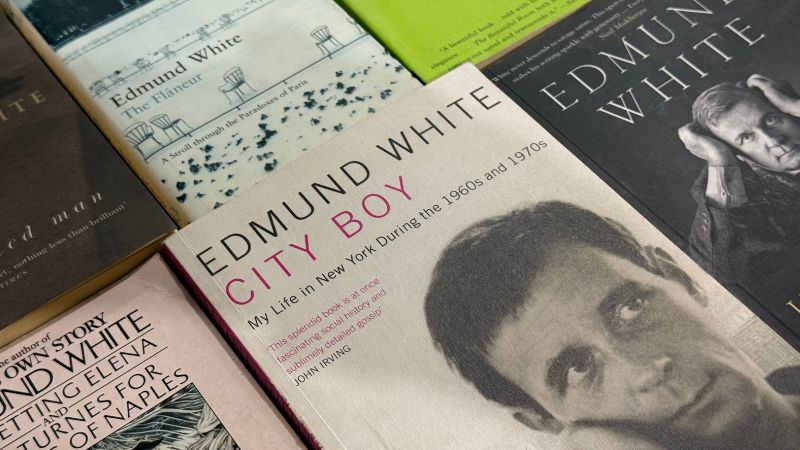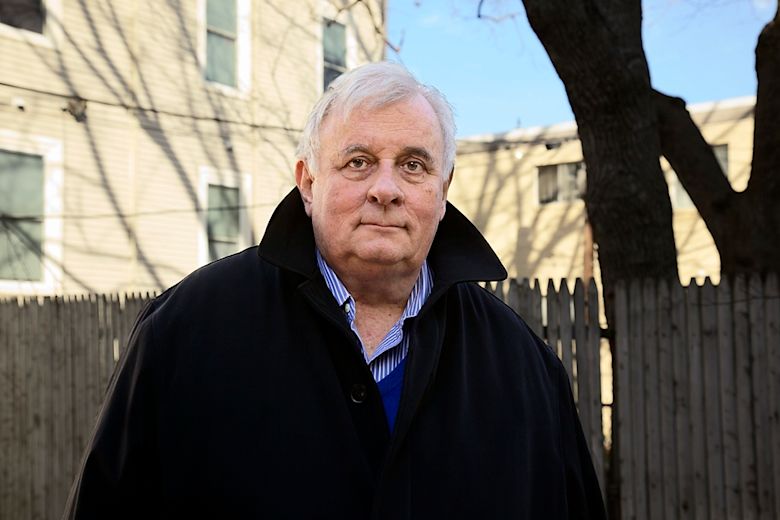Author Edmund White has died, he was 85 years old. His passing was confirmed by his agent Bill Clegg, who shared White died at his home in Manhattan. The author was waiting for ambulance after experiencing stomach pains when he passed away.
He is survived by his husband of almost 30 years Michael Carroll.
White was known as a ground breaking author of gay literature. He wrote extensively about his own life, as well as writing novels, biographies and a memorable guide to gay sex.
He has been referred to as the godfather of gay literature, and wrote non-fiction works as much as he wrote fiction.

White was offered a place to study at Harvard, but he chose to go to the University of Michigan because he didn’t want to move away form his therapist who had promised that he could be cured of homosexuality – he’s later write about the experience in his books.
He oved to new York, and alter San Francisco where he worked as a freelance writer and later a magazine editor. In the evenings he’s work on his own works.
His debut novel Forgetting Elena was released in 1973 and has been interpreted as a coded commentary on gay culture. The novel was praised by Vladimir Nabokov who called it a “marvelous book”.
In 1977 he collaborated with Charles Silverstein to publish The Joy of Gay Sex.
In the early 1980s he was a founder of the New York based organisation Gay Men’s Health Crisis, the earliest community led groups to raise awareness about HIV/AIDS. The same year he released his best known work A Boy’s Own Story, his first volume of autobiographic-fiction.
He continued the fictionalised story of his own life with The Beautiful Room is Empty in 1988, and The Farewell Symphony in 1997.
He moved to Paris in 1983, a city he would make his home for many years. Here he made friends with French philosopher Michel Foucault.
In 1984 White learned that he had contracted HIV, a development he said was hardly surprising. At the time people being diagnosed with the virus could expect very short lifespans with few treatment options available.
White later reflected on this period of his life sharing that he had expected to live only a year or two at this point, his friend Foucault died the same year, it later being revealed that he was HIV positive.
Foucault’s partner Daniel Defert founded the French HIV awareness organisation AIDES, and White became a prominent advocate of the group. White found that his case of HIV was classed as non-progressor, one of a tiny percentage of people who carry the virus but do not progress to developing a AIDS status.
He wrote a series of biographies on subjects including Jean Genet, Marcel Proust and Arthur Rimbaud. His work on Genet took seven years to write, and won his the Pulitzer Prize for Biography. White became an avid reader and student of French literature. He also wrote several books about Paris and his experiences in the city.

Returning to live in the USA in 1997 he released a steady stream of books including A Married Man, and Fanny: A Fiction, while also authoring a play Terre Haute, which imagined a fictionalised meeting between author Gore Vidal and terrorist Timothy McVeigh.
He continued writing volumes of his autobiographical stories including My Lives, City Boy and The Loves of My Lives, the latter being a sex memoir that was published earlier this year.
In the explicit work about his sex life he estimated that for over 20 years he’d had sex with a least three different men each week. In the book he wrote: “I thought it was quite normal to take a break from writing at two in the morning, saunter down to the piers, and have sex with 20 men in a truck. When I wrote that I’d had sex over the years with 3,000 men, one of my contemporaries asked pityingly: ‘Why so few?’”
In City Boy White recalled how he was waling home early on the morning of June 28 1969 when the police raided he Stonewall Inn in Greenwich Village where they met unexpected residence from it’s gay clientele. He reflected on the significance of the subsequent riots that propelled the gay rights movement around the world.
“Up till that moment we had all thought that homosexuality was a medical term. Suddenly we saw that we could be a minority group — with rights, a culture, an agenda.” he wrote.
White also shared his knowledge of writing with others teaching at Brown University and becoming a professor of creative writing at Princeton University.
Over is life he wrote sixteen novels, a play, three biographies, six non-fiction works, six volumes of autobiography, and put together four anthologies.
Reflecting on White’s impact Sir Alan Hollinghurst wrote in The Guardian that author’s life had traversed many different eras of gay life.
“Edmund White’s luminous career was in part a matter of often dark history: he lived through it all. He was a gay teenager in an age of repression, self-hatred and anxious longing for a “cure”; he was a young man in the heyday of gay liberation, and the libidinous free-for-all of 1970s New York; he was a witness to the terrifying destruction of the gay world in the AIDS epidemic in the 1980s and 90s.” he said.




